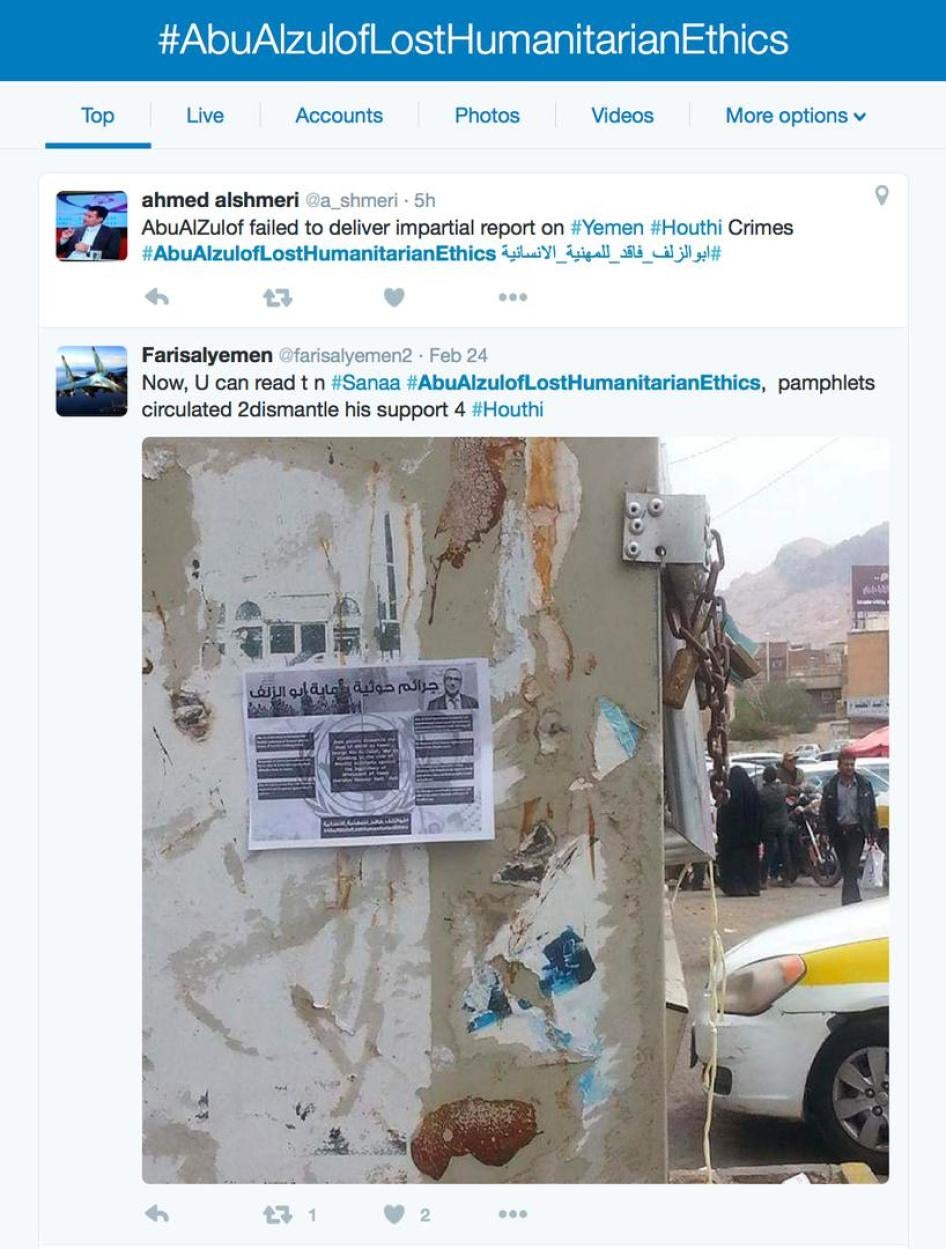I carry out human-rights work in the age of social media, but the hashtag #AbuAlzulofLostHumanitarianEthics is one of the most disturbing I’ve seen in a long time. It’s one more wrong move that has turned the hope for a new day in Yemen into a humanitarian and human-rights disaster.
Documents leaked to Human Rights Watch say that the hashtag is the product of a media campaign coordinated by the Yemeni Media Association, a group in the Saudi Arabian capital, Riyadh, which was reportedly established and funded by the Yemeni government. The campaign aims to attack and discredit George Abu al-Zulof, the representative of the United Nations High Commissioner for Human Rights to Yemen, and his office.
The current war in Yemen, now a year old, has pitted a Saudi-led coalition against the Houthis, a northern Yemeni group that now controls Sanaa, the capital, and elsewhere in the country. The Yemeni government of Abdu Rabbu Mansour Hadi, exiled in Saudi Arabia, is trying to oust the Houthis from power. According to the UN, more than 3,200 civilians have been killed, more than half by Saudi-led coalition airstrikes with support of the exiled Yemeni government.
Some of the air attacks have hit hospitals, schools and clinics, media have reported, while in other cases, factories, marketplaces, a displaced persons camp and even wedding parties have been bombarded, where no military presence appeared to be nearby. On March 15, at least 106 civilians, including 24 children, were bombed in a marketplace in northwest Yemen, based on media reports.
The campaign against Abu al-Zulof, which began in February, has included op-eds in Arabic across different Yemeni media outlets, and as one of the leaked campaign memos said, plans exist to submit at least three in English. Posters featuring Abu al-Zulof’s photograph and slogans accuse him of bias toward the Houthis. Abu al-Zulof told Human Rights Watch that the sectarian language — including accusations that he is an agent for Hezbollah — has led to death threats against him and exposed his staff in Yemen to risk of reprisals.
The attacks allege that Abu al-Zulof’s office has limited its documentation of human-rights violations in Yemen to one side of the conflict: the Saudi-led coalition. Even a glance at the office’s regular reports disproves this claim.
I have met Abu al-Zulof and his staff, and since I am trained to document human-rights abuses as the core of my own work, I have seen the rigor with which they document the violations committed by all sides they investigate, issuing public statements only when they have clear evidence.
Moreover, this move by the Yemeni government is just a new chapter in its smear campaign against Abu al-Zulof. In early January, the government informed Zeid Ra’ad al-Hussein, the UN high commissioner for human rights, that Abu al-Zulof was persona non grata in the country and must be replaced. The move came after Zeid’s office warned of escalating civilian casualties, many from airstrikes by the Saudi-led coalition, and noted that it had received alarming reports of the coalition’s use of cluster munitions, a globally banned weapon. The Saudis deny using such weapons.
A day later, the government hastily rescinded the demand to oust Abu al-Zulof, succumbing to external pressure. But since then, it has continued to try to undermine the important work of Abu al-Zulof and the human-rights officers working for him in the field.
Both sides to the conflict in Yemen have committed serious violations of the laws of war. Since the nine-country coalition began its military campaign a year ago, the UN has reported serious abuses by both sides, including the use of child soldiers by the Houthis and blocking humanitarian aid by the Saudis in Yemeni ports. But much of the damage in the war has been inflicted by aerial bombardments — in civilian areas.
The United States has provided tactical support to the Saudi coalition, while Britain has been providing bombs and other weaponry in what has become a deep political embarrassment for both governments as the war continues to take its toll on Yemeni civilians. Efforts to resolve the conflict have been strategically kept out of the hands of the UN Security Council, for the most part.
At the UN Human Rights Council in Geneva last September, Zeid recommended an “international, independent and impartial” investigation into alleged war crimes by all sides in Yemen. Twenty nongovernmental organizations, including Human Rights Watch, supported the call, and the Netherlands presented a draft resolution that would create such an investigation.
After intense lobbying by Saudi Arabia, made possible by the passivity of a number of countries, including the US and Britain, the Netherlands withdrew its draft resolution. Instead of creating its own commission of inquiry, the council chose to rely on a Yemeni national commission of inquiry. To mitigate much-deserved criticism that the domestic inquiry would not be impartial, the resolution that did pass also said the Office of the High Commissioner should assist the national commission in meeting international obligations.
In comments afterward, the US ambassador to the UN in Geneva, Pamela Hamamoto, acknowledged that UN support would be crucial to ensuring the credibility of the domestic investigation.
The initial expulsion of Abu al-Zulof from Yemen and now the smear campaign against him cast serious doubt on the government’s willingness, let alone capacity, to ensure that national investigations are carried out with credibility.
As reports of unlawful attacks on civilians in Yemen continue, all members of the Human Rights Council and other concerned countries, including the US and Britain, should indicate their support for an international investigation as a first step toward providing justice for Yemen’s victims. Recognizing the terrible effect this war has had on Yemeni civilians and the continuing attacks against public sites, the government should welcome these investigations.









